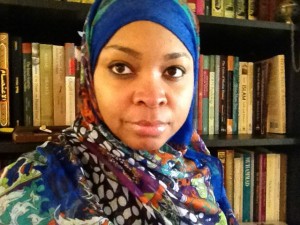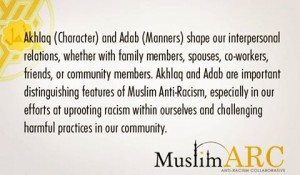
By Margari Hill, a Founder and Programming Director of Muslim ARC. She can be found on twitter @margari_aziza
I embraced Islam in the 90s, a period of Black consciouness in Hip Hop, with artists who popularized Islam like Rakim, Brand Nubian, and Poor Righteous Teachers from my home town Trenton New Jersey. Guru from Gang Starr dropped the line, “I was raised like a Muslim, praying to the East …” I viewed Spike Lee’s Malcolm X (1992) a year before my conversion in the fall of 1993. Even our fashion was influenced by the Nation of Islam, as X emboldened hats and t-shirts at Juneteenth festivals. The summer before I started community college, I went on to read Malcolm X’s FBI files and read about social movements in medieval North Africa. Social justice drew me to Islam.
Malcolm X inspired so many of us, Black, White, and Latino converts, even children of Arab and South Asians immigrants. In those early years, I was inspired by Malcolm X’s message of racial justice, his critique against white supremacy both in America and abroad, by Ali Shariati’s liberation theology, and the writings of Alija Izetbegovic, the first Muslim president of a European country, Bosnia.
My college radicalism and religious devotion waned as I struggled as a college dropout from 1998 until 2001. It was during the dot com bubble with skyrocketing rent prices when I had few opportunities or job prospects as a service worker. Then 9/11 occurred just days before I was about to return to college. In those first months, I became a passionate spokesperson for my faith and commited myself to the graduate study of Islam. While in graduate school, I studied Muslim social networks, transformations in Islamic learning, and anti-colonial resistance. Graduate school was brutal. While abroad, during my darkest time of my life, I found a renewed faith. I left graduate school, taught at an Islamic school for two years, as well as an introductory course to world religions at Delaware County community college. I’ve worked with students of all ages as a historian by training and a long time educator.
While social justice and resistance to white supremacy inspired me to become Muslim, I am new to social justice work. In 2014, I co-founded Muslim Anti-Racism Collaborative to address anti-blackness and racism in Muslim communities. In addition to human rights law and instructional design, our work draws heavily from traditional Islamic sciences of Qur’an exegesis, Prophetic sayings, and Islamic jurisprudence. We draw from our spiritual tradition and encourage our members to do as well.
MuslimARC is a new organization but we have been active since our beginning. We began with social media campaigns in order to reach scholars, educators, and community leaders across North America, to raise awareness and to pool our resources. Within the first month, we organized high school and university workshops. We organized the “All from Adam” panel at the largest national gathering of Muslims, Islamic Society of North America’s (ISNA) annual convention, in order to kick start a national conversations about racial justice in Muslim communities. This was one of the first times race was discussed at the annual convention. Within our first year, we reached over 1,000 people through workshops and panels. Our work deepened as we developed toolkits for Muslim communities to use in support of #BlackLivesMatter. It was put into practice at the Muslilms Make It Plain rally and march in Philadelphia. In 2015, we have doubled our reach: organizing workshops at the Get SMART (So-Cal Muslim Anti-Racism Training) conference, where we came together to address structural racism including mass incareration, immigrant rights, and inner city poverty. We worked with Fatimah Kight, Ummah Wide, and the Arab American Association of New York to raise $100,000 to support Black churches that were damaged or destroyed by arson. During this second year at ISNA we launched our Muslims and the New Jim Crow campaign where 250 participants signed an online petition as a first action.
Recently I relocated to Southern California, and I have been blessed to work with forward thinking Muslims who practice what we preach as Muslims. Sara Jawaid at LA Voice has been particularly inspirational to me as a community organizer. She has worked with La Asociación Latino Musulmana de America (LALMA) and ISLAH canvassing and phone banking South Central communities in support of Prop 47, which turned several felonies to misdemeanors. The Los Angeles chapter of Council of American Islamic Relations (CAIR-LA), has supported legislation challenging racial profiling including AB953, which calls for mandatory reporting of identity profiling. Muslims were among the faith leaders calling for Governor Brown to sign this important legislation.
This year we are deepening our anti-racism work to include immigrant rights. There is much we can learn from Victor Narro’s work. He has provided valuable tools in his Law@theMargins article, “Practicing What we Preach.” There, he offers some concepts that are directly aligned with Islam’s egalitarian ethos. Here is what immediately comes to mind:
Conociemento directly corresponds to a term in the Qur’an “Verily we created you of different tribes and nations so that you may get to know one another (li-ta’arafu)” (49:13) This term is often superficially translated, to mean “get to know one another” but it really means this exchange and discovery. Sheikha Muslemah Purmul has talked about this concept with more eloquence than I can write. This verse is much of the basis of MuslimARC’s work on bridge building and intercultural exchange.
Courageous conversations is something that is also very important in our work and our relationships. Speaking truth to our friends, peers, and other community members is something that can be found in the Prophetic example of communication. The root word of friend in Arabic means telling the truth, even companion has connotations of rubbing against one another and at times friction. Another concept is that we are mirrors for one another, meaning that our friends can show us aspects of ourselves that we may not be able to see. We highlight this in our anti-racism work.
Storytelling is very much central to our work. Sharing our stories is important so that we may become familiar with each other and build empathy.
Giving praise reminds me of the hadith Prophetic saying, “Those who do not thank people, they do not thank Allah.” (Al-Tirmidhi 1878).

At MuslimARC, we also emphasize mindfulness and the practice of renewing one’s intentions in doing anti-racism work. We also incorporate compassionate communication, also known as Non-Violent Communication. We utilize tools for active listening and engagement, often borrowing from other faith traditions. There is so much wisdom and beauty in spiritual practices from people of all faiths, and I hope to incorporate more from Native American and African traditions. I felt such a deep bond with people who gathered outside of the Los Angeles County Men’s jail, engaging with the Pope’s message of restoring dignity. For me, this is the the main purpose of interfaith work, of being vehicles for the Creator’s Mercy.
MuslimARC continues its work to amplify the gains made by training other Muslim communities on racial justice and how to organize. We work on coalition building within the Muslim community and beyond. For us, the most important work is the shift in consciousness in our faith community, in seeing young people find their faith relevant in today’s world, and in forming lasting bonds that exemplify our faith tradition of connecting people from all walks of life and backgrounds.




